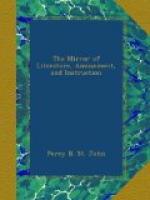at his own
expense, with which he for some time maintained the king’s cause
in the north. He, however, possessed little of the skill of a
general, though he was a splendid soldier of fortune. He gained
a signal victory over Lord Fairfax, near Bradford, and some
others of less importance; but he was utterly defeated at
Marston Moor, after which he left the country in despair of the
royal cause. He resided for some time at Antwerp with his lady,
where they were frequently in much distress. On his return to
England, at the Restoration, he was received with the respect
due to his unshaken fidelity, and in 1664, was created Earl of
Ogle and Duke of Newcastle. He passed the remainder of his life
in retirement, devoting himself to literature, to which he was
much attached, and attending to the repair of his fortune.
He died in 1676, aged 84, and was buried with his duchess in
Westminster Abbey. His literary labours are now almost forgotten,
if we except his principal production, “A new method and
extraordinary invention to dress Horses,” &c., which has obtained
much praise from judges in the art. Grainger quaintly remarks,
that “the Duke of Newcastle was so attached to the Muses, that
he could not leave them behind him, but carried them to the camp,
and made Davenant the poet-laureate, his lieutenant-general of
the ordnance.” His second wife was Margaret, the imaginative
Duchess of Newcastle, who never revised what she had written,
lest it “should disturb her following conceptions,” by which
means she composed plays, poems, letters, philosophical
discourses, orations, &c.; of these she left enough to fill
thirteen folio volumes, ten of which have actually been printed.
Lord Orford has drawn a curious picture of the literary
characters both of this lady and her husband. They were
panegyrised and flattered by learned contemporaries; for, in
those days flattery was well paid. It is, however, gratifying
to learn that the duchess derives infinitely more honour from
her fine character as a wife and mistress of a family, than
from either her literary productions or these panegyrics.
expense, with which he for some time maintained the king’s cause
in the north. He, however, possessed little of the skill of a
general, though he was a splendid soldier of fortune. He gained
a signal victory over Lord Fairfax, near Bradford, and some
others of less importance; but he was utterly defeated at
Marston Moor, after which he left the country in despair of the
royal cause. He resided for some time at Antwerp with his lady,
where they were frequently in much distress. On his return to
England, at the Restoration, he was received with the respect
due to his unshaken fidelity, and in 1664, was created Earl of
Ogle and Duke of Newcastle. He passed the remainder of his life
in retirement, devoting himself to literature, to which he was
much attached, and attending to the repair of his fortune.
He died in 1676, aged 84, and was buried with his duchess in
Westminster Abbey. His literary labours are now almost forgotten,
if we except his principal production, “A new method and
extraordinary invention to dress Horses,” &c., which has obtained
much praise from judges in the art. Grainger quaintly remarks,
that “the Duke of Newcastle was so attached to the Muses, that
he could not leave them behind him, but carried them to the camp,
and made Davenant the poet-laureate, his lieutenant-general of
the ordnance.” His second wife was Margaret, the imaginative
Duchess of Newcastle, who never revised what she had written,
lest it “should disturb her following conceptions,” by which
means she composed plays, poems, letters, philosophical
discourses, orations, &c.; of these she left enough to fill
thirteen folio volumes, ten of which have actually been printed.
Lord Orford has drawn a curious picture of the literary
characters both of this lady and her husband. They were
panegyrised and flattered by learned contemporaries; for, in
those days flattery was well paid. It is, however, gratifying
to learn that the duchess derives infinitely more honour from
her fine character as a wife and mistress of a family, than
from either her literary productions or these panegyrics.
[2] Rhode’s Excursions, Part iv.
* * * * *
WITCHCRAFT AND SPONTANEOUS COMBUSTION.
(To the Editor.)
As your journal is open to the elucidation of any facts or traditions connected with history, perhaps you will not consider the following attempt at the elucidation of a singular subject, unworthy of your pages. There is something pleasing in every successful attempt at tracing tradition to a rational and philosophical cause, an origin to which many of the most absurd and incredible may be referred.




